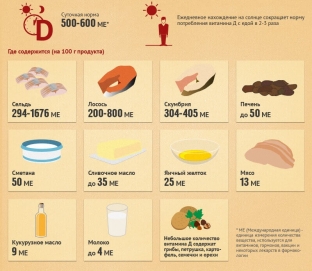Vitamins play a huge role in the human body. They help the proper formation of organs from the womb and are constantly involved in the life of the whole organism. Today we will talk about the lack of vitamin D. What disease does the deficiency lead to? this vitamin? Why does it arise? What symptoms accompany its deficiency? What should be done to compensate for the deficiency of this vitamin. How does the correct menu solve this problem? Studying with estet-portal.com
Why Vitamin D Deficiency Occurs
The main purpose of consuming this vitamin – help the body absorb calcium. Vitamin D is divided into 2 groups D2 (ergocalciferol) and D3 (cholecalciferol).
There are a number of reasons why this vitamin is deficient. It could be:
- Lack of sun exposure;
- Frequent use of creams with UV factors;
- Residing in northern areas where daylight hours are very short;
- Old age (insufficient absorption of the vitamin into the body);
- Diseases of the gastrointestinal tract (with such diseases, vitamin D enters the body in insufficient quantities);
- Too strict or vegan diet (when too many foods are excluded – beriberi increases);
- Pregnancy and periods of breastfeeding.
What diseases can be caused by vitamin D deficiency
The benefits of vitamin D for the human body are obvious. The norm for an adult is 5-10 mcg per day. It enhances the body's resistance to skin diseases and bone diseases. Often affects the ability to withstand complex physical and psycho-emotional stress.
It is especially necessary for infants, as it participates in the formation of the musculoskeletal system, which is the basis for a healthy baby growth. With its deficiency, – rickets.
For adults, vitamin D deficiency can cause diseases such as:
- Osteoporosis (most often in women, leads to fractures of the femoral neck, vertebrae and general fragility of the skeleton);
- Cancer diseases;
- Cardiovascular disease;
- Demineralization of teeth and bones (calcium is not absorbed);
- Paresthesias
- Impotence (in men)
- Arthritis
- Multiple sclerosis
- Asthma
- Headache
- Hypertension.
What are the symptoms of vitamin D deficiency
The attending physician will help to establish that you have a deficiency of one or another vitamin, but the following symptoms may be a reason to sound the alarm:
- Weakness for no reason
- Fatigue
- Muscle cramps
- Joint pain
- Deformation of dental tissue
- Weight loss.
Of the psychological factors, with a lack of vitamin D, depression is diagnosed.
Vitamin D deficiency prevention
First of all, what you need to pay attention to is what kind of diet we consume daily. To make up for the lack of this vitamin, you need to add or increase the consumption of the following range of products:
- Sour-milk products (sour cream, cheese, cottage cheese, whey, butter);
- Fatty fish varieties (herring, mackerel, tuna, salmon, mackerel, halibut, cod, fish liver);
- Seafood;
- Oatmeal;
- Greens;
- Nettle, dandelion greens.

As practice shows, there is not a lot of vitamin D in plant foods, so you need to focus on food of animal origin.
However, we get vitamin D not only from food. It is synthesized in our body when exposed to direct sunlight. We urgently need to be at least 20 minutes a day in the sun to make up for its lack. But you need to remember that sunbathing is also useful to get dosed so as not to get burns on the skin.
You should not ignore vitamin and mineral complexes, especially when its shortage is very acute. Your doctor will always be able to advise you on the correct dosage.






Add a comment